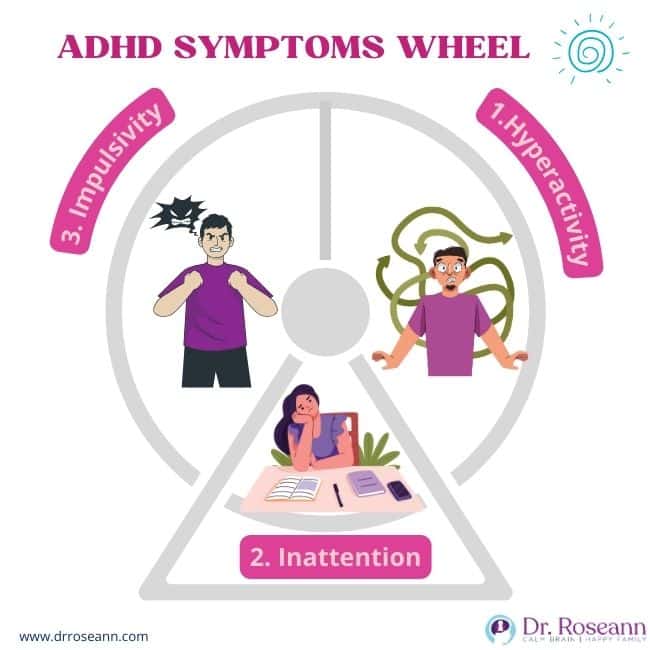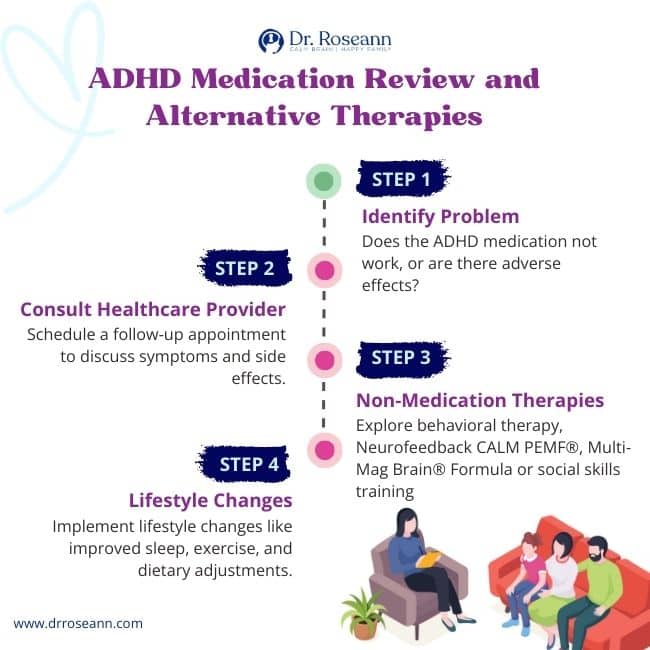If you're using ADHD medications for your child, you're likely familiar with the ups and downs of finding the proper treatment. But have you ever wondered if its benefits outweigh its side effects? But the more important question is, can Adderall make ADHD worse?
When taken by someone with ADHD, Adderall and similar medications should ideally provide a sense of increased focus, reduced impulsivity, and improved attention span. However, it's crucial to remember that every individual's response to medication can vary.
Many of my clients seek me out because of side effects from stimulant medications. That can be a very scary experience when a parent trusts that these medications are safe and don’t fully understand what could happen.
In some cases, Adderall can paradoxically worsen ADHD symptoms. While stimulant medications are effective for many individuals with ADHD, there are instances where they may not work as expected or could even exacerbate symptoms. This can be distressing for both parents and children alike.
Prescription stimulants like methylphenidate (Ritalin, Concerta) and dextroamphetamine (Dexedrine) are commonly used to treat ADHD, helping individuals feel more focused. However, there has been a significant increase in misuse among students and athletes due to misconceptions about their performance-enhancing effects (Lakhan & Kirchgessner, 2012).
While some studies suggest cognitive benefits, there can be severe risks, including psychosis, heart problems, and even death. Long-term safety studies and education on the dangers of misuse are crucial, especially considering the widespread belief in their benefits.

ADHD Symptoms Wheel: Understanding the Core Clusters
The ADHD Symptoms Wheel provides a clear, visual representation of the common behaviors associated with Attention Deficit Hyperactivity Disorder (ADHD). The wheel is divided into three key clusters: hyperactivity, inattention, and impulsivity. Each section contains a collection of symptoms frequently observed in individuals with ADHD, offering an at-a-glance guide to understanding the core characteristics of the disorder.
Hyperactivity
This cluster encompasses behaviors indicating heightened energy levels and excessive movement. Key symptoms include:
- Constant fidgeting or tapping
- Difficulty remaining seated
- Talking excessively
- Always “on the go” or feeling restless
Inattention
Inattention refers to difficulty in maintaining focus, managing tasks, and organizing thoughts. Symptoms in this cluster may include:
- Easily distracted by external stimuli
- Struggling to complete tasks or follow through on instructions
- Frequently losing or misplacing items
- Trouble organizing work or personal activities
Impulsivity
Impulsivity describes behaviors that reflect a lack of self-control or difficulty delaying gratification. Typical symptoms in this cluster consist of:
- Interrupting or intruding on others' conversations or activities
- Difficulty waiting for one's turn
- Making hasty decisions without considering consequences
- Speaking or acting without thinking
Is it ADHD or something else?
Attention Deficit Disorder Medication Side Effects
Understanding the potential side effects of ADHD medication is essential. Stimulants may cause side effects such as decreased appetite, difficulty sleeping, irritability, and, in rare cases, mood changes or worsening of existing psychiatric conditions. There are several reasons why Adderall may not be providing the desired benefits:
- Incorrect Dosage: Sometimes, the prescribed dosage may be too low to manage symptoms effectively.
- Individual Response: Each person's body chemistry is unique, and what works for one may not work for another.
- Tolerance: Over time, some individuals may develop a tolerance to the medication, leading to reduced effectiveness.
- Comorbid Conditions: If your child has coexisting conditions like anxiety or depression, these may influence how they respond to ADHD medication.
So, what can you do if Adderall isn't working or is making ADHD symptoms worse? Here are some strategies to consider:
- Reevaluate the Treatment Plan: Work closely with your child's healthcare provider to reassess their medication regimen. Adjustments to dosage or switching to a different medication may be necessary.
- Explore Non-Medication Options: Behavioral therapy, organizational skills training, and lifestyle changes can complement medication or serve as alternatives for managing ADHD symptoms.
- Consider Alternative Medications: If Adderall isn't the right fit, other medications are available, such as Ritalin, Concerta, Vyvanse, or non-stimulant options like Strattera.

How to Fix ADHD Without Medication: Improving Alertness, Naturally
In my practice, I've encountered numerous cases where Adderall didn't provide the expected benefits or even made ADHD symptoms worse. One memorable case involved a young boy whose hyperactivity increased significantly after starting Adderall. After a thorough evaluation, we discovered that he had an underlying anxiety disorder that exacerbated his symptoms. Adjusting his treatment plan to address both conditions led to significant improvement.
If you're concerned about Adderall making ADHD worse or if your child's medication isn't working as expected, don't hesitate to reach out to your healthcare provider. Remember, finding the proper treatment for ADHD often requires patience and perseverance.
We can explore alternative solutions prioritizing your child's well-being without compromising their health. To help you address ADHD using natural solutions, download the Natural ADHD Focus Formula Kit.
How should Adderall make you feel if you have ADHD?
If you have ADHD and you're taking Adderall, ideally, you should feel more focused, with an improved attention span and reduced impulsivity. It should help you feel more organized and control your thoughts and actions. However, the exact experience can vary from person to person, so it's essential to communicate any changes or concerns with your healthcare provider.
Can ADHD meds make ADHD worse?
Yes, in some cases, ADHD medications like Adderall can paradoxically worsen ADHD symptoms for specific individuals. This can happen due to various factors such as incorrect dosage, individual response differences, or the presence of coexisting conditions like anxiety or depression. It's essential to monitor any changes in symptoms and communicate them promptly with your healthcare provider to ensure the best treatment plan.
Can ADHD meds cause depression?
Yes, ADHD medications can sometimes lead to feelings of depression in specific individuals, although this is not common. It's essential to monitor mood changes carefully while taking ADHD medication and discuss any concerns with your healthcare provider. They can help determine if the medication is contributing to the depression or if other factors at play need to be addressed.
Can Adderall stop working?
Yes, Adderall can stop working effectively over time for some individuals. This can happen due to various factors, including the development of tolerance, changes in brain chemistry, or adjustments needed in dosage.
What to do when Adderall stops working?
When Adderall stops working effectively, it's essential to consult with your healthcare provider for guidance. They may recommend adjustments to your dosage, switching to a different medication, or exploring complementary therapies such as behavioral interventions or lifestyle changes. It's crucial not to make any changes to your medication regimen without professional guidance to ensure the best outcome for managing your ADHD symptoms.
Why you shouldn't take Adderall?
While Adderall can be effective for managing ADHD symptoms for many individuals, there are reasons why it may not be suitable for everyone. Some people may experience side effects such as decreased appetite, difficulty sleeping, or mood changes. Additionally, Adderall can be habit-forming and may have the potential for misuse or abuse, especially in those without ADHD.
Why doesn't Adderall work for me?
There are several possible reasons why Adderall may not work effectively for you. It could be due to factors such as an incorrect dosage, individual differences in how your body responds to the medication, the presence of coexisting conditions like anxiety or depression, or the development of tolerance over time.
How to manage ADD without meds?
Managing ADHD without medication involves utilizing behavioral therapy, lifestyle changes, mindfulness techniques, educational support, and parenting strategies to address symptoms effectively. By implementing these strategies and seeking support from professionals and support networks, individuals with ADHD can optimize their functioning and quality of life without relying on medication.
Does ADHD go away with medication?
ADHD is a neurodevelopmental disorder, and medication does not cure it. However, medication can effectively manage symptoms and improve functioning while it's being taken. Without ongoing treatment, symptoms often return.
Dr. Roseann is a mental health expert in ADHD Treatment who frequently is in the media:
- Seeme & Liz 12 Essential Parenting Tips For Kids with ADHD
- Evan H. Hirsch, MD – EnergyMD with Dr. Roseann Capanna-Hodge (Video) Topic: Is it Brain Fog or ADHD?
- The Healthy 12 Silent Signs of Adult ADHD You Might Be Ignoring
Always remember… “Calm Brain, Happy Family™”
Disclaimer: This article is not intended to give health advice and it is recommended to consult with a physician before beginning any new wellness regime. *The effectiveness of diagnosis and treatment vary by patient and condition. Dr. Roseann Capanna-Hodge, LLC does not guarantee certain results.
Are you looking for SOLUTIONS for your struggling child or teen?
Dr. Roseann and her team are all about science-backed solutions, so you are in the right place!
Grab your complimentary copy of
147 Therapist-Endorsed Self-Regulation Strategies for Children: A Practical Guide for Parents
Dr. Roseann is a Children’s Mental Health Expert and Licensed Therapist who has been featured in/on hundreds of media outlets including The Mel Robbins Show, CBS, NBC, PIX11 NYC, Today, FORBES, CNN, The New York Times, The Washington Post, Business Insider, Women’s Day, Healthline, CNET, Parade Magazine and PARENTS. FORBES called her, “A thought leader in children’s mental health.”

She coined the terms, “Re-entry panic syndrome” and “eco-anxiety” and is a frequent contributor to media on mental health.
Dr. Roseann Capanna-Hodge has three decades of experience in working with children, teens and their families with attention-deficit hyperactivity disorder (ADHD), autism, concussion, dyslexia and learning disability, anxiety, Obsessive Compulsive Disorder (OCD), depression and mood disorder, Lyme Disease, and PANS/PANDAS using science-backed natural mental health solutions such as supplements, magnesium, nutrition, QEEG Brain maps, neurofeedback, PEMF, psychotherapy and other non-medication approaches.
She is the author of three bestselling books, It’s Gonna Be OK!: Proven Ways to Improve Your Child's Mental Health, The Teletherapy Toolkit, and Brain Under Attack. Dr. Roseann is known for offering a message of hope through science-endorsed methods that promote a calm brain.
Her trademarked BrainBehaviorResetⓇ Program and It’s Gonna be OK!Ⓡ Podcast has been a cornerstone for thousands of parents facing mental health, behavioral or neurodevelopmental challenges.
She is the founder and director of The Global Institute of Children’s Mental Health, Neurotastic™Brain Formulas and Dr. Roseann Capanna-Hodge, LLC. Dr. Roseann is a Board Certified Neurofeedback (BCN) Practitioner, a Board Member of the Northeast Region Biofeedback Society (NRBS), Certified Integrative Mental Health Professional (CIMHP) and an Amen Clinic Certified Brain Health Coach. She is also a member of The International Lyme Disease and Associated Disease Society (ILADS), The American Psychological Association (APA), Anxiety and Depression Association of America (ADAA) National Association of School Psychologists (NASP), International OCD Foundation (IOCDF).
© Roseann-Capanna-Hodge, LLC 2024










